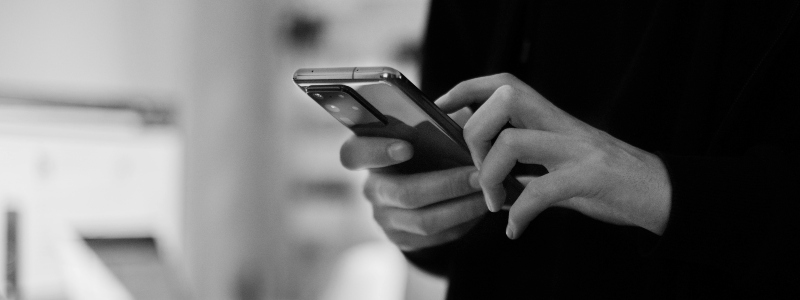How many of us are seldom more than an arms length from our mobile phone? Our bags, clothing, even our sports wear is designed with special pockets for its’ safe keeping. For most of us it has infiltrated every sphere of life, a constant companion. Staying connected has never been so easy. Mobiles are for people (like us) on the move – always contactable – but never confined. As long as we are never too far from a power source and a signal we can bridge the gap between together and apart. It is a familiar modern experience to encounter, in a public space, a café, a bus, a pedestrian walkway, others, eyes down ensconced in their device. For many of us it feels jarring, not least because we know that we are not immune to the same behaviour. We no longer seek the eyes as a point of entry into the world of another.
Virtual proximity
Ours is a time when proximity no longer requires physical closeness just as physical closeness no longer determines proximity. Virtual proximity renders human connection simultaneously more frequent and more shallow, more intense and more brief. Getting in touch is no obstacle to staying apart. Notions of community have shifted with the tides of of socio political, economic and technological time. So too has our relationship to home. We now slip into our separate houses, more often our separate room’s bypassing the shared spaces, seeking ‘our own space’. The virtual ‘network’ is now the place we gather, the new village square, the new community, residing behind each closed door. We are lonelier than ever… more connected than ever.
Reflection
This is not a a condemnation of technology or technological innovation, how ignorant and foolish that would be. Rather it is an expression of concern about a gradual erosion of social and relational skills, of face to face, up front and personal human interaction. The more our attentions are absorbed in a virtual kind of proximity do we risk losing these skills ? Might we fail to learn them in the first place or reject them all together. Are we choosing to replace intimate proximal partnerships with virtual networks – and where may it lead us?
Quantity v quality
The language of ‘connections’ subtly usurps the language of ‘relationships’. Connections are ‘virtual relations’ entered and exited at the press of a button. In a virtual network connecting and disconnecting share the same status, are made on demand and broken at will. In a virtual network we are free to roam as we please and to terminate those connections which no longer interest or satisfy us. The old fashioned networks of ‘kinship’ and ‘partnership’ and ‘committed relationship’ are far more slow moving, clunky and messy than their virtual counterparts and certainly far more difficult to exit. Turnover is the cardinal measure of success in the consumer world. Consumer life favours lightness and speed. Variety and novelty are valued over durability. Commitment and sharing in this context lose their meaning and our appetites for interpersonal risk taking (relating) decline.
There is no doubt that in infinite ways technology improves and enhances our lives as individuals and communities. It is true too that wherever there is something gained there is inevitably something lost. So let us all remember to keep the bonds of human connection alive. Look up, make eye contact, maybe smile or say hello to the next person we stand next to in a queue or a lift. Face time for real! Let’s switch off our devices from time to time and not automatically grant them space at our tables when we commune with real life friends and family. And let’s leave them outside the bedroom door at the end of the day and reclaim that space for rest, restoration and good old human connection.
Gerry Gilmartin is an accredited, registered and experienced psychotherapeutic counsellor. She currently works with individuals (young people/adults) and couples in private practice. Gerry is available at our Brighton and Hove Practice.
Further reading by Gerry Gilmartin –
Love, commitment and desire in the age of choice

Leave a Reply